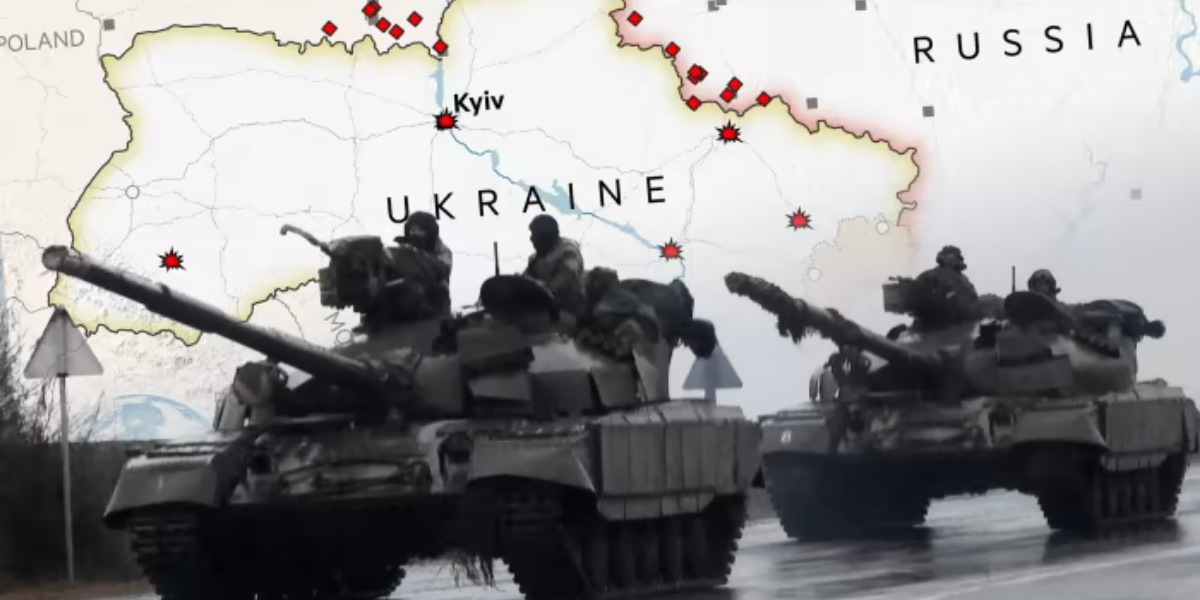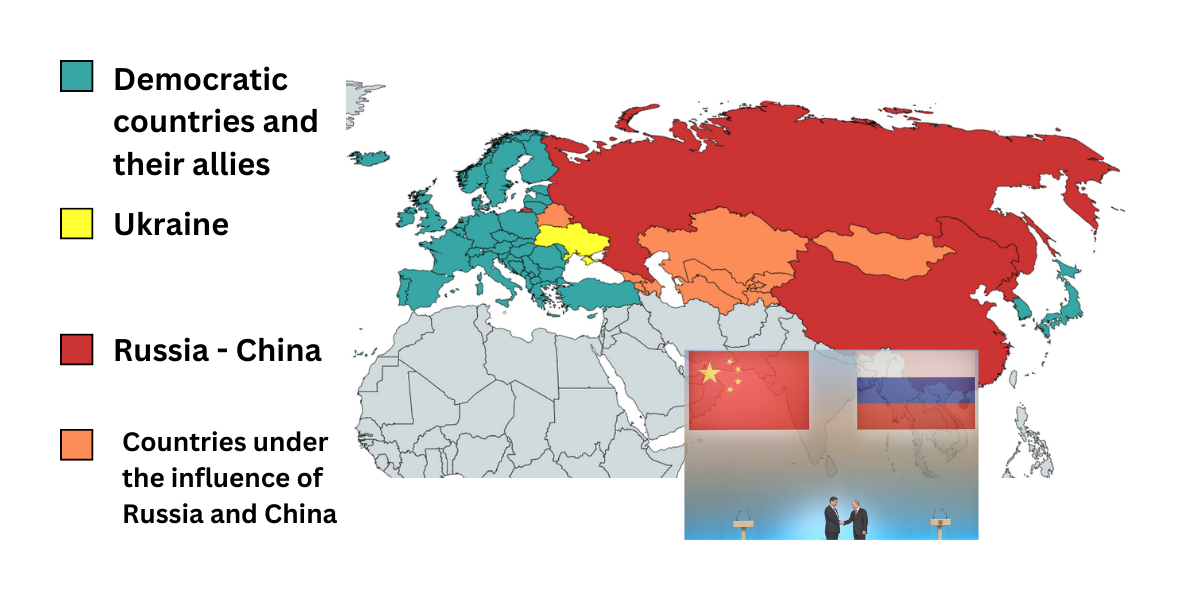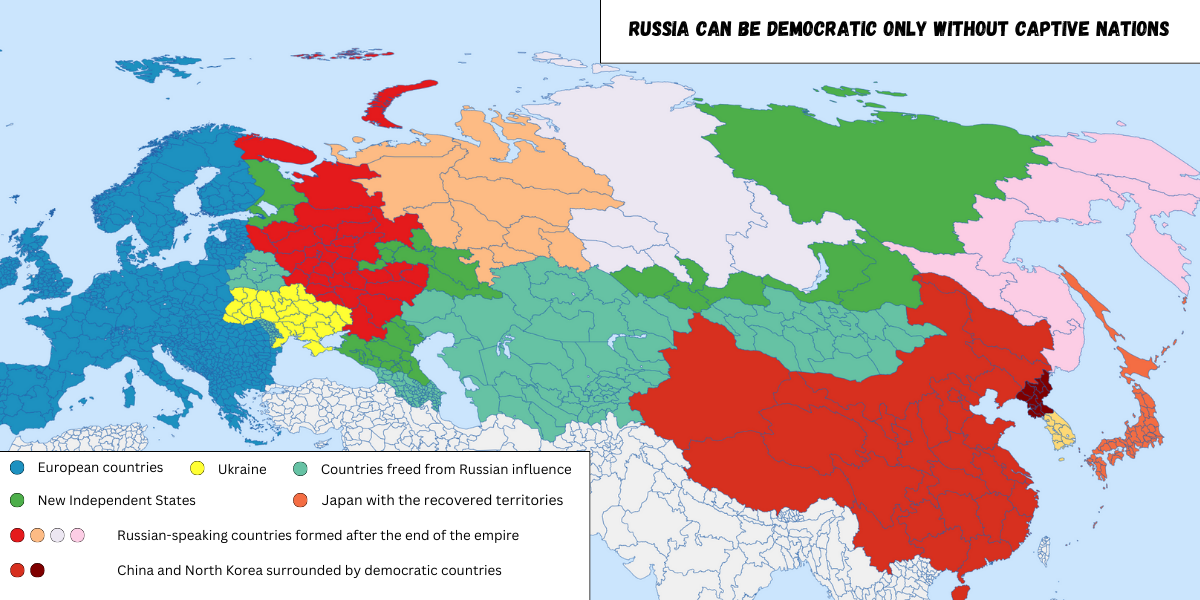New Independent States and Global Security
The Oirat-Kalmyks have been held captive by Russia for 253 years.
New Independent States and Global Security
For 17 months now, the Ukrainian people have been heroically fighting the Russian Empire, which is waging an aggressive war to turn the sovereign state into a Russian colony. Despite the support of Western democracies for Ukraine, the Russian army continues full-scale warfare all along the frontline and still holds captured territories. The flow of manpower and weapons supplied from the bowels of the vast country is not decreasing.

This is not surprising, given the scale of the territory and raw material base of the aggressor country. An important role is also played by the fact that there are still several sovereign countries under Russian control: Belarus, Georgia, Armenia, Kazakhstan, Kyrgyzstan, which are forced to provide overt and covert support, fearing a military invasion by an aggressive neighbor. Belarus is actually forced to give up its sovereignty and is a full-fledged satellite of the Kremlin. Despite the orientation of Georgia and Armenia to the European, democratic path of development, and the "multi-vector" policy of Kazakhstan, these countries are involved in circumventing sanctions and other effective economic forms of assistance to Russia, and accordingly strengthen the military power of the aggressor country. Citizens of the CIS countries voluntarily and involuntarily join the ranks of the Russian army. Russia has disturbed the peace in Europe, is waging a large-scale war against Ukraine and threatens the whole world with nuclear catastrophe.
But the most significant danger is the Moscow-Beijing axis for the world. Only the West's full support for the sovereignty of Russia's national republics, provinces and regions can prevent close cooperation and alliance between the two authoritarian regimes from threatening the free world. Liberation from centuries of colonial oppression of the peoples held captive by Moscow is the most important tool for neutralizing the largest player against the free world, the official strategic adversary of the United States - the People's Republic of China. It is worth recalling that in 21 national republics with the status of a federation subject and in 4 autonomous national districts live about 40 million people, almost a third of the country's population. The territories of national republics and autonomous regions make up 75% of the total area of the Moscow Empire, where more than 80% of natural resources are being extracted. The disintegration of the empire into new independent states will automatically lead to the reduction of raw materials and human resources to which Moscow has access and the cessation of wars of conquest, every day, threatening to lead to a catastrophe in the world. August 6, 1945, a tragedy similar to Hiroshima and Nagasaki could happen again if the Kremlin is not stopped. The newly independent states will forever bury Moscow's revanchist imperial ambitions, because a small country in the center of the Eastern European Plain will have no economic or political power.

With the emergence of new independent states, the empire that harms the world by its very existence will disappear:
(a) the Kremlin extends its influence over other countries through corruption. It is no secret that Moscow spends its profits from the sale of oil, gas and metals to bribe politicians and extremist groups, to promote hatred, trying to undermine democracies from within;
(b) the large-scale extraction of natural resources for subversive activities accelerates global warming;
(c) Russia is doing irreparable damage to the planet's ecology with one hand, and with the other hand is building armadas of tanks that destroy Ukrainian cities every day. Russia's actions are forcing NATO countries to increase their military budgets, which in turn causes the social welfare of the citizens of the North Atlantic bloc to suffer. "Healthcare for All" may never come for the people of the United States.
The nations held captive by Russia live in poverty so that every living thing on the planet suffers.
In this regard, it is important to remember that the Soviet Union was much stronger than today's Russia because it had the full resources of all 15 union republics. In addition, six of today's European countries, Bulgaria, Romania, Hungary, Czechoslovakia, Poland and the GDR, were politically and economically chained to the Soviet empire. They were called Eastern Bloc countries. These countries were subject to a policy of Russification (compulsory study of the Russian language at school and in all higher education institutions), ideological control and economic suppression, and direct occupation by the Soviet army. Only in 1994 Soviet troops were withdrawn from the Eastern Bloc countries after 49 years of occupation. This was the beginning of the disintegration of the empire.
With the collapse of the Soviet Union:
(a) The costly arms race with the USSR and the Cold War, which lasted more than 40 years, ended. And that's billions of dollars freed up for peaceful purposes and the welfare of citizens.
(b) For the last 30 years until the day of Russia's invasion of Ukraine, Western democracies have been steadily reducing spending on the military, which could not but affect the health of state budgets.
(c) The three new countries - Ukraine, Belarus and Kazakhstan - voluntarily renounced nuclear weapons, which significantly increased the level of security in the world.
(d) Politically, the collapse of the USSR brought about a number of fundamental changes. After the fall of the Berlin Wall, the German people were united and the FRG became twice as large territorially, demographically, economically and politically. 16 million inhabitants of the GDR became full-fledged citizens of free Europe. Germany is now the economically strongest country in the European Union.
(e) Democratic Europe has strengthened and expanded considerably. All six Eastern Bloc countries with a population of approximately 118 million people, as well as sovereign Estonia, Latvia and Lithuania, have become members of the European Union and the NATO Alliance.
(f) All 14 republics that have become sovereign States have realized their right to statehood, identity, culture and languages. Freedom from colonial oppression was the dream of many generations who had fought for freedom for centuries. None of the 14 republics that have become sovereign have posed a threat to world security or to the democratic foundations of Western countries. Single conflict situations between the CIS countries are of a localized nature, but mostly provoked by Russia, and in no way threaten to escalate into a third world war.
The question arises: How did the collapse of the USSR affect global security? The answer is unambiguous - positively. I dare to say more - Western democracy and global security benefited the most from the new political reality.
The following question arises: If the collapse of the Soviet Union was peaceful and led to positive changes, why would the collapse of the Russian Empire be dangerous for the United States and the countries of Western Europe? If Kazakhstan, Ukraine and Belarus once gave up nuclear weapons stationed on their territories, why is the same option now considered impossible by Western politicians?
Another argument, cited by Western politicians in favor of keeping Russia indivisible and nuclear-armed, is the fear that China will occupy the territories of newly independent states in the Far East and Siberia or that these states will fall under Chinese influence. This begs the question: why is the occupation of small new states more dangerous for global security than an alliance between the two military and economic giants Russia and China? One should not forget that China is an empire with captive nations. Any China's aggression towards the new states threatens to cause unrest within the Chinese empire. Deprived of a strong ally in Russia, China will reduce its ambitions in foreign and domestic policy.
By choosing to preserve the Russian Empire, Western politicians are repeating the same mistake for the third time in the last 100 years: in 1920, the West did not support the movement of captive nations, betting on the White Guards, who stood for a united and indivisible Russia. This allowed the Communists to revive an empire in the form of the USSR. The price of the mistake was 70 years of confrontation with the mighty USSR on all fronts and a debilitating arms race. In the 1990s, the West again opposed Russia's disintegration, allowing the Kremlin to wage two wars against sovereign Chechnya. The price of the mistake is the current war, which threatens to become World War III or a nuclear catastrophe.

History teaches us that the only way to democratize Russia is to disintegrate it into new independent states. Any period of freedom after Russia is preserved in its former borders quickly ends with a return to totalitarianism. Why does this happen? Non-Russian peoples conquered by Russia have a rich history of their own states, different cultures and languages. Therefore, these peoples use the period of freedom to realize their right to self-determination and to create their own states. Moscow and the Russian people respond to the movement of non-Russian peoples toward independence by curtailing freedoms. In order to hold the captive nations the government provokes conflicts, launches propaganda of hatred, which often lead to a war against a national republic. The Russian majority, as a result of nationalistic propaganda, and in many ways due to a predisposition to chauvinism and imperial mindset, elects a dictator in the next election. The Russian state enters another cycle of hating the entire world. To break this vicious circle, it is necessary either to physically destroy non-Russian peoples, or to support their aspirations to restore their states. And it is possible to support these peoples only during the period of Russia's weakening, not when the process of curtailing freedoms has begun.
Dr. Maria Ochir, Oirat-Kalmyk Congress
Albert Sharapov, Oirat-Kalmyk Congress